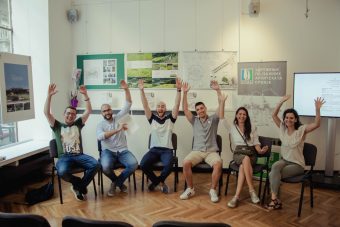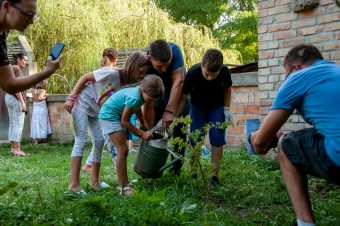Life in a local community can be much better if it fosters a collective spirit and turns criticism into action, as eight students from Indjija demonstrated by founding the Association Indjijativa. For a year and a half, they roused dormant citizens and municipal authorities and solved more than 100 problems in their city. The spirit of their activism is now slowly spreading across Serbia

We would all like to have a healthier and better-arranged environment, yet again there are very few situations in which we are ready to do something about it jointly. When they realised that want to change many things that bother them in their city and that criticism and complaints will not improve anything, eight students from Indjija spontaneously came up with the idea to do something and move from words to deeds. That is how the Indjijativa, an association of volunteers and activists, was created with the aim of working together with citizens and authorities on identifying and solving various problems in their local community.
With their activity, the members of Indjijativa have awakened their fellow citizens and authorities of municipal government, although reactions to their work have been divided from the very beginning. “There were both positive and negative reactions. Citizens initially obser-ved us with a great deal of suspicion, seeking to fathom the motives of our work which they thought were hidden and driven by personal interest. On the other hand, the municipal authorities had a very positive attitude towards us since they liked the zest and enthusiasm we radiated. Things changed, over time. Citizens have come to love us, due to the work and act that stood behind us, and we were not afraid to praise the municipal government when there were reasons for it, but also to criticise when criticism was more than necessary. With such an attitude, however, the doors of the municipality were left ajar to us,” says Mladen Rajic, one of the activists of the association, which now has seven experts of different professions, united in their desire to encourage positive changes in the society.
In focus:
The fellow-citizens regularly contact them via email or social networks with the request of solving a problem, and the members of Indjijativa ask them to describe the issue in detail and to send them a picture or a video. Very often, they conduct site visits and talk to citizens about the problems that bother them. Then they contact the relevant services through the System 48 – a platform implemented in the municipality to report utility problems. If there is a different type of problem, they address the institutions in written or oral form, using all the means and tools secured by legal regulations and according to the rules of democratic society operation – they write petitions, requests for the information of public importance, petitions, etc. “What is perhaps our mark is that we give a media character to everything which brings the problems closer to the whole community. That creates public focus and achieves a certain amount of pressure that encourages decision-makers to come up with a solution,” Mladen points out.

Much of their credibility has been built through the portal indjijativa.rs and social networks, which helped them to become more visible not only locally but also across the country. Thus, the residents of Indjija, as well as the who-le of Serbia, can see that this association has been able to initiate and help to solve more than 1000 problems in the-ir municipality over the past year. They are proud of each of those actions, but they set aside a charity picnic at the Koki Zoo, where they organised series of workshops and an auction of paintings, and the money they raised was given for the treatment of two little fellow citizens. Action-reaction attracted significant attention, when the members followed up illegal cut down of two linden trees in the centre of the city and asked the authorities to punish the perpetrator and plant new trees. The last action they are particularly proud of is launching a campaign #prO2disi that encourages fellow citizens to plant trees and reduce the use of plastic bags.
Based on the previous experience, the members of Indjijativa noticed that the citizens are most sensitive to problems for which it is clear that the money from the budget was poorly used or misspent. “Those problems directly affect the majority of the citizens, and they activate around them more,” says Mladen, adding that on the other hand, the municipal authorities are most firm on the issues that directly indicate the irresponsibility of the authorities. “Usually, these are the things that should have been resolved by a project or allocated funds from a budget, but they haven’t. Here we come upon a conflict that escalates with any criticism that is publicly addressed to those who we find guilty. Certainly, it is complicated to solve problems that require a strategic and long run of dealing with them, since the perspective of those responsible for dealing with the problem usually extends over a four-year period – which is a length of their term.”
There are also situations in which a problem cannot be solved persistently, but the members of Indjijativa do not surrender. One such an example is the problem of a curb located at the pedestrian crossing that is unsuitable for people with walking difficulties or moving in wheelchairs, as well as mothers who often pass there with strollers since it is at the beginning of the pedestrian zone in the city centre. “We have been waiting for the solution of the problem, precisely for the curb to be removed, for almost a year. We got promises from the competent authorities that the problem would be solved within a few days, another one when the construction season begins, etc. The reasons why this has not been resolved yet are now clear to us, and for the anniversary of not solving the problem, we are preparing a performance which will, as we hope, draw attention and resonate beyond Indjija and provoke a reaction. The point is not to give up on any problem,” Mladen points out.
One of the goals of the association is to make Indjija, as one of the least green municipalities in Vojvodina, European Green Capital. Since Vojvodina is generally poorly afforested region, and Indjija is one of the most developed municipalities, the members of Indjijativa believe that it should take the lead in reversing this trend. Indjijativa members did not only awake Indjija, but they have also motivated many local communities across the country.
At the end of the year, Indjijativa members are slowly finishing the existing actions, such as planting trees, and they are preparing for the new ones. Soon they will set “kind-hearted” racks, on which citizens can put away their unnecessary clothes so that the ones who need it can take it. At the same time, they are working on a project for revitalisation of children’s playgrounds and sports fields in the municipality with an emphasis on increasing the green areas. The project should start at the beginning of the next construction season if everything goes as planned.
When asked how much Indjija changed in the last year and a half, Mladen Rajic proudly points out that despite pollution, their activism is being spread in the air, and it provokes positive reactions among citizens. They are now motivated to step out of their comfort zone, speak out loud about their problems, and start looking for a way to solve them themselves. The members of this association are encouraged by the fact that they realise they are not alone and that they have the support and help.
Prepared by: Gordana Knezevic
This article was published in the new issue of the Energy portal Magazine GRINNOVATIONS, December 2019 – February 2020.



